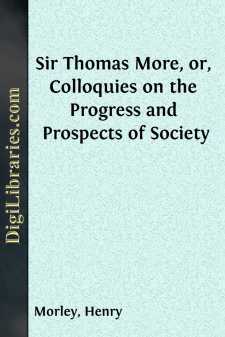Categories
- Antiques & Collectibles 13
- Architecture 36
- Art 48
- Bibles 22
- Biography & Autobiography 813
- Body, Mind & Spirit 142
- Business & Economics 28
- Children's Books 16
- Children's Fiction 13
- Computers 4
- Cooking 94
- Crafts & Hobbies 4
- Drama 346
- Education 46
- Family & Relationships 57
- Fiction 11829
- Games 19
- Gardening 17
- Health & Fitness 34
- History 1377
- House & Home 1
- Humor 147
- Juvenile Fiction 1873
- Juvenile Nonfiction 202
- Language Arts & Disciplines 88
- Law 16
- Literary Collections 686
- Literary Criticism 179
- Mathematics 13
- Medical 41
- Music 40
- Nature 179
- Non-Classifiable 1768
- Performing Arts 7
- Periodicals 1453
- Philosophy 64
- Photography 2
- Poetry 896
- Political Science 203
- Psychology 42
- Reference 154
- Religion 513
- Science 126
- Self-Help 84
- Social Science 81
- Sports & Recreation 34
- Study Aids 3
- Technology & Engineering 59
- Transportation 23
- Travel 463
- True Crime 29
Sir Thomas More, or, Colloquies on the Progress and Prospects of Society
by: Henry Morley
Categories:
Description:
Excerpt
It was in 1824 that Robert Southey, then fifty years old, published “Sir Thomas More, or Colloquies on the Progress and Prospects of Society,” a book in two octavo volumes with plates illustrating lake scenery. There were later editions of the book in 1829, and in 1831, and there was an edition in one volume in 1837, at the beginning of the reign of Queen Victoria.
These dialogues with a meditative and patriotic ghost form separate dissertations upon various questions that concern the progress of society. Omitting a few dissertations that have lost the interest they had when the subjects they discussed were burning questions of the time, this volume retains the whole machinery of Southey’s book. It gives unabridged the Colloquies that deal with the main principles of social life as Southey saw them in his latter days; and it includes, of course, the pleasant Colloquy that presents to us Southey himself, happy in his library, descanting on the course of time as illustrated by the bodies and the souls of books. As this volume does not reproduce all the Colloquies arranged by Southey under the main title of “Sir Thomas More,” it avoids use of the main title, and ventures only to describe itself as “Colloquies on Society, by Robert Southey.”
They are of great interest, for they present to us the form and character of the conservative reaction in a mind that was in youth impatient for reform. In Southey, as in Wordsworth, the reaction followed on experience of failure in the way taken by the revolutionists of France, with whose aims for the regeneration of Europe they had been in warmest accord. Neither Wordsworth nor Southey ever lowered the ideal of a higher life for man on earth. Southey retains it in these Colloquies, although he balances his own hope with the questionings of the ghost, and if he does look for a crowning race, regards it, with Tennyson, as a
“far off divine event
To which the whole Creation moves.”
The conviction brought to men like Wordsworth and Southey by the failure of the French Revolution to attain its aim in the sudden elevation of society was not of vanity in the aim, but of vanity in any hope of its immediate attainment by main force. Southey makes More say to himself upon this question (page 37), “I admit that such an improved condition of society as you contemplate is possible, and that it ought always to be kept in view; but the error of supposing it too near, of fancying that there is a short road to it, is, of all the errors of these times, the most pernicious, because it seduces the young and generous, and betrays them imperceptibly into an alliance with whatever is flagitious and detestable.” All strong reaction of mind tends towards excess in the opposite direction. Southey’s detestation of the excesses of vile men that brought shame upon a revolutionary movement to which some of the purest hopes of earnest youth had given impulse, drove him, as it drove Wordsworth, into dread of everything that sought with passionate energy immediate change of evil into good. But in his own way no man ever strove more patiently than Southey to make evil good; and in his own home and his own life he gave good reason to one to whom he was as a father, and who knew his daily thoughts and deeds, to speak of him as “upon the whole the best man I have ever known.”
In the days when this book was written, Southey lived at Greta Hall, by Keswick, and had gathered a large library about him. He was Poet Laureate. He had a pension from the Civil List, worth less than £200 a year, and he was living at peace upon a little income enlarged by his yearly earnings as a writer. In 1818 his whole private fortune was £400 in consols. In 1821 he had added to that some savings, and gave all to a ruined friend who had been good to him in former years. Yet in those days he refused an offer of £2,000 a year to come to London and write for the Times. He was happiest in his home by Skiddaw, with his books about him and his wife about him....












